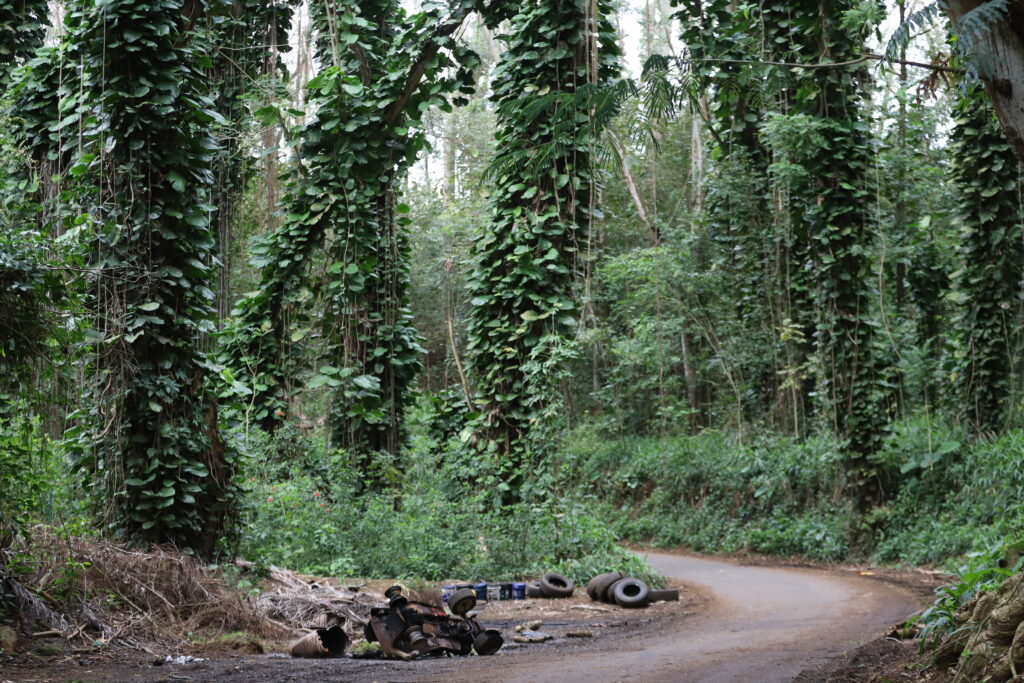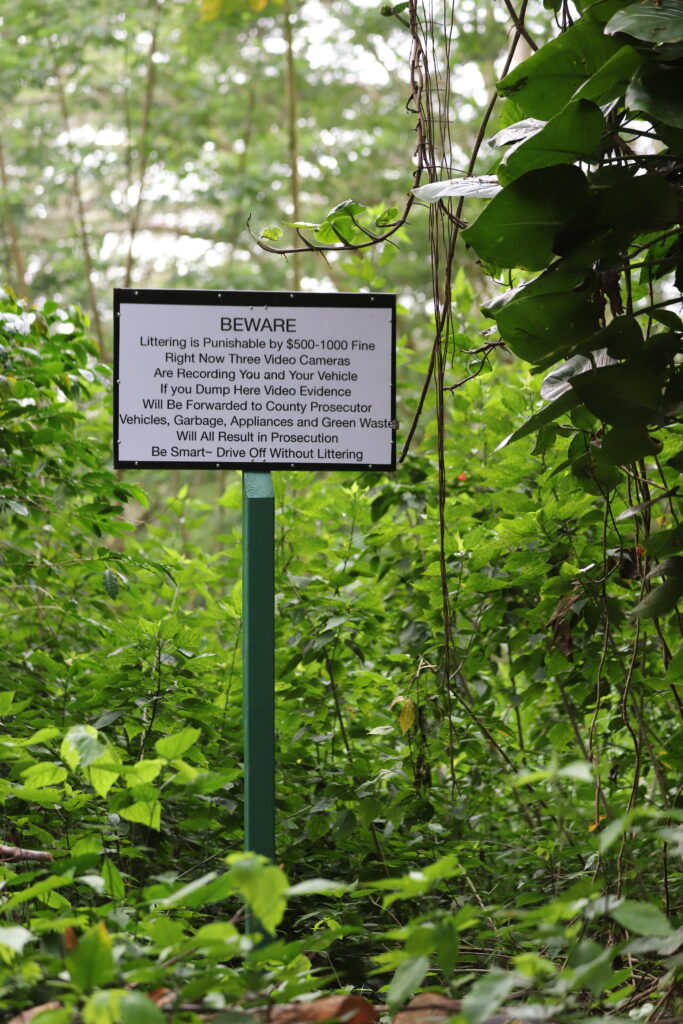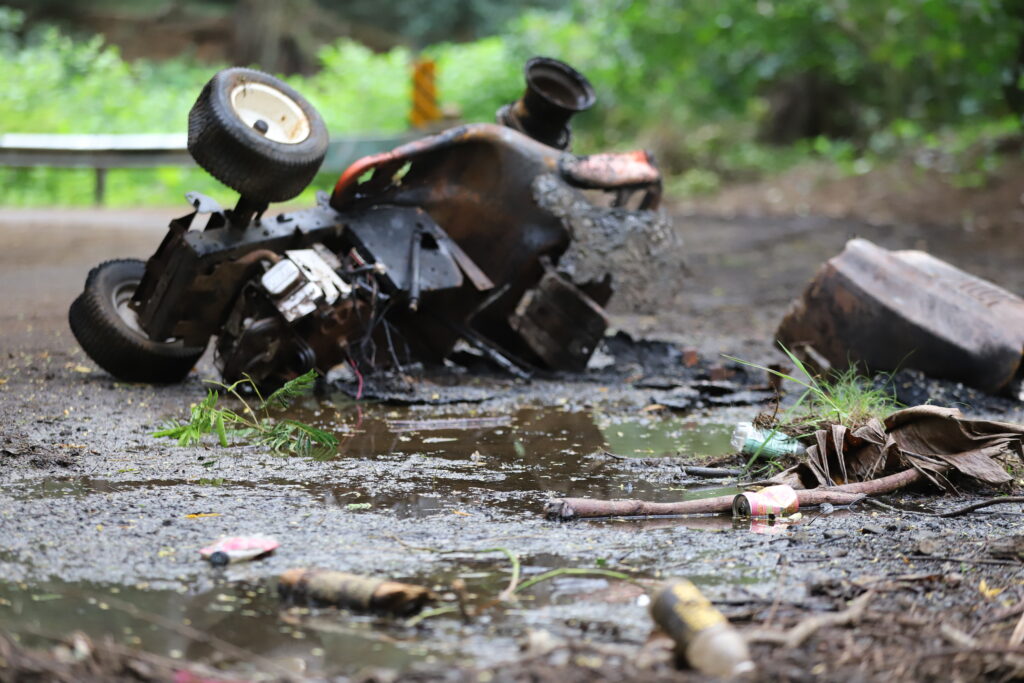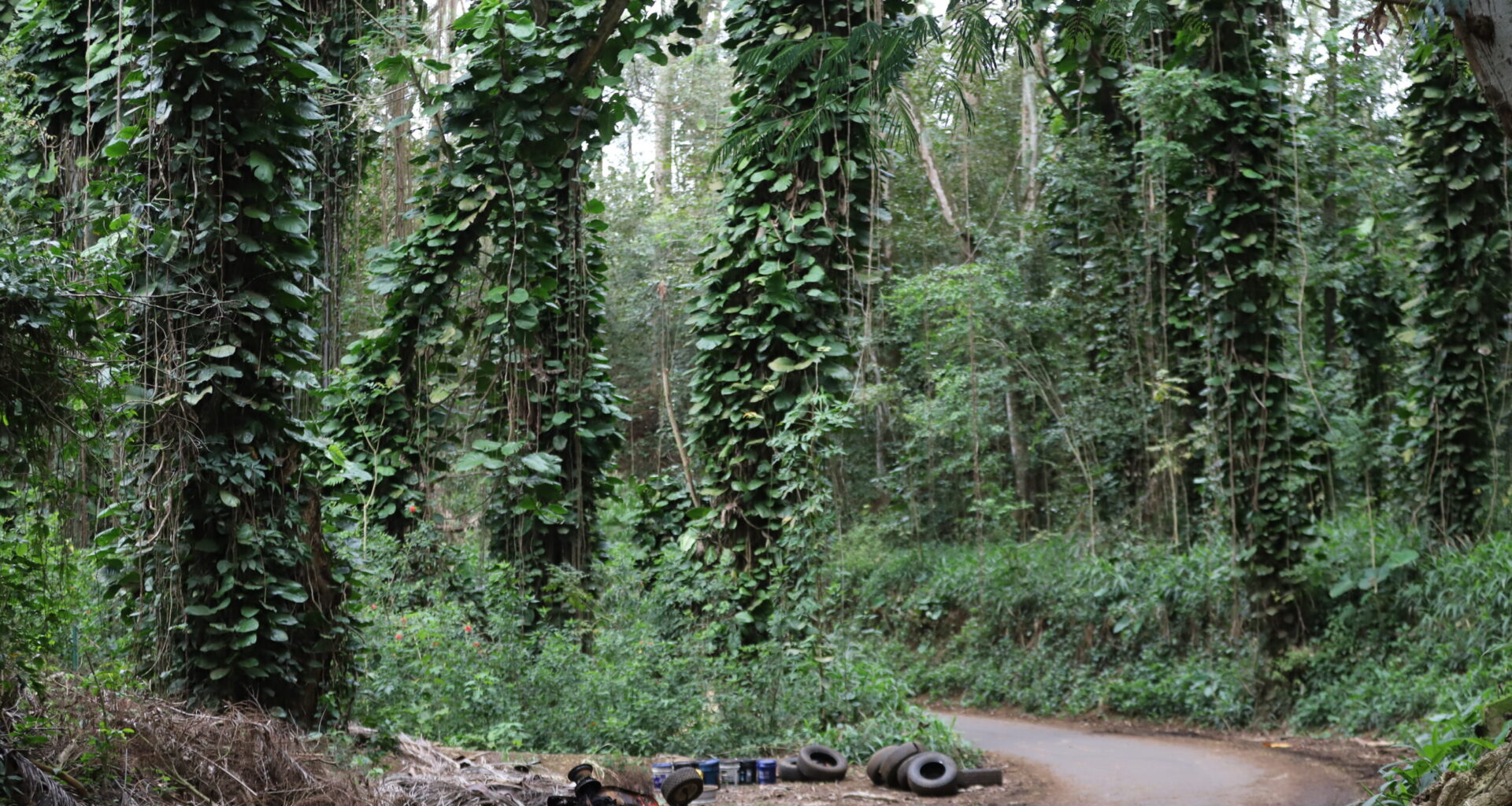Peʻahi Road in Haʻikū is lined by towering trees, brightly colored flowers and lush, tropical greenery. For years, Mauricio Lopez has enjoyed riding his bike or motorcycle down the winding street, pausing at the bridge near Kaupakalua Reservoir to take in the way that sunlight filters through the forest canopy overhead.
“The leaves almost glitter or shimmer in the sunlight,” said Lopez, who has lived on Maui for about 30 years and operates a small farm in Haʻikū. “When it’s sprinkling — and there will often be this drizzle as you drive through — it’s a magical light effect. It’s almost indescribable.”
But just a few hundred feet away, a stretch of the roadway has become a dumping ground for litter and hazardous waste. On occasion, entire vehicles have been left on the road’s shoulder and set ablaze, he said.
“When I see that, the first thing I feel is sadness,” Lopez said. “The second is anger.”
 Residents and others seeking peace and beauty are frustrated by the site of trash along a section of Peʻahi Road in Haʻikū. (Erin Nolan/Civil Beat/2025)
Residents and others seeking peace and beauty are frustrated by the site of trash along a section of Peʻahi Road in Haʻikū. (Erin Nolan/Civil Beat/2025)
Last week, leaky auto parts, piles of old tires, rusted beer cans and discarded gasoline jugs and canisters were scattered in muddy puddles and stood out in what appeared to be an otherwise pristine rainforest.
A sign that Lopez said was posted among the debris by a particularly fed-up local warned would-be litterbugs that video cameras were surveilling the area and those caught dumping illegally could face hefty fines and even criminal charges.
“That sign is really effective!” a cyclist shouted as he sped past the site, where a Civil Beat reporter was photographing mounds of rubbish.
Illegal dumping is a statewide problem as people try to flout disposal costs or just seek convenience. But compared to some other unofficial junkyards, the site of rubbish along the scenic Peʻahi Road has touched a nerve for locals and others who appreciate the area’s natural beauty.
The junk is more than just an eyesore, Lopez said. It is a health hazard to the local families who regularly walk, bike or jog along the scenic street. Contaminants from discarded batteries, paint cans and vehicle parts also end up in local reservoirs and streams that lead to the world-famous Jaws surf break, which he said threaten the entire watershed.
 Authorities have largely been foiled in efforts to stop people from illegal dumping. (Erin Nolan/Civil Beat/2025)
Authorities have largely been foiled in efforts to stop people from illegal dumping. (Erin Nolan/Civil Beat/2025)
Government officials have struggled for years to end the illegal dumping and reduce the number of derelict vehicles abandoned on Maui and across the state.
It is a longstanding issue without a clear-cut solution, Lopez acknowledged, but Haʻikū residents have repeatedly raised their concerns about hazardous waste disposed of on Peʻahi Road’s shoulder with the county government, the police and the agriculture company that owns the abutting property. It does not appear that any of those parties have attempted to properly clean the area or deter people from continuing to use it as a make-shift dump, he said.
While Peʻahi Road is maintained by the Maui County Department of Public Works, the land on either side of the street is privately owned by East Maui Irrigation Co., which is owned and operated by Mahi Pono.
The farming company has long been aware of the situation, said Mark Vaught, Mahi Pono’s vice president of water resources and infrastructure.
In response to requests for an interview from Civil Beat, the company sent a statement attributed to Vaught.
“As farmers with large agricultural areas, we are also frustrated with ongoing illegal dumping in our community,” he said in the emailed statement.
The littering “primarily occurs within the County’s right of way,” Vaught said, but the company has been working closely with county officials “to post signage and explore additional solutions to help deter this activity.” He added that a Mahi Pono security team is also monitoring the area, and he encouraged anyone who witnesses illegal dumping on Peʻahi Road or anywhere else on the island to report the act to the Maui Police Department.
Vaught said any clean-up efforts would be overseen by the county.
The Maui County Department of Public Works “routinely responds to clean up illegal dumping in the county right of way,” and anyone can report abandoned vehicles or other trash that has been improperly disposed of at SeeClickFix or COM Connect, according to a statement from the department that was provided by county spokeswoman Lila Lawrence. It added that “enforcement of illegal dumping” is handled by the police.
The county clears trash and dumped material from the location roughly once a month when debris accumulates to the point that it obstructs the roadway, Lopez said, but little is done to ensure contaminants are completely removed.
 Batteries, auto parts, paint cans, gasoline jugs and other hazardous waste are often dumped on the roadside. (Erin Nolan/Civil Beat/2025)
Batteries, auto parts, paint cans, gasoline jugs and other hazardous waste are often dumped on the roadside. (Erin Nolan/Civil Beat/2025)
“It’s a beautiful place, and it changes,” he said, describing how trash and waste builds up between clean-up efforts. “It’s like a chameleon – it goes from beautiful and shining to heartbreaking all within a month. Just like the moon, it seems to have its bright full moons and its dark new moons.”
Lopez would like the county to put pressure on Mahi Pono to address the situation by threatening to fine the company every time the county has to send a team out to clear private property.
“Mahi Pono could allocate more resources to engineering a solution, something like physical or perhaps psychological barriers, if necessary, to impede people unloading,” he said.
“Or perhaps if they realize that stopping these people is almost impossible, they could provide dumpsters, and then the dumpsters are painted with beautiful murals,’ he added, “so that those who insist on continuing to do that have a proper place to do that.”
Who is Responsible?
While illegal dumping on Peʻahi Road occurs both on private property owned by Mahi Pono and within the county’s right of way, the official county website notes that the Department of Public Works’ Highway Division is responsible for picking up litter and maintaining road shoulders.
Michael Kinores, the Highway Division’s chief of field operations and maintenance: Michael.Kinores@co.maui.hi.us
Jordan Molina, the director of the Department of Public Works: public.works@mauicounty.gov or (808) 270-7845
People can also report abandoned vehicles or illegal dumping online at SeeClickFix or COM Connect.
Civil Beat’s coverage of Maui County is supported in part by a grant from the Nuestro Futuro Foundation.

Sign up for our FREE morning newsletter and face each day more informed.
Sign Up
Sorry. That’s an invalid e-mail.
Thanks! We’ll send you a confirmation e-mail shortly.

